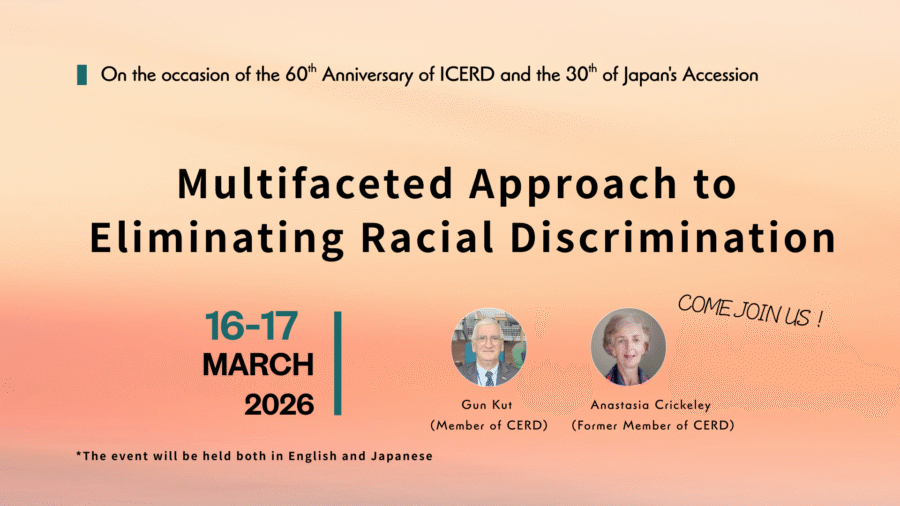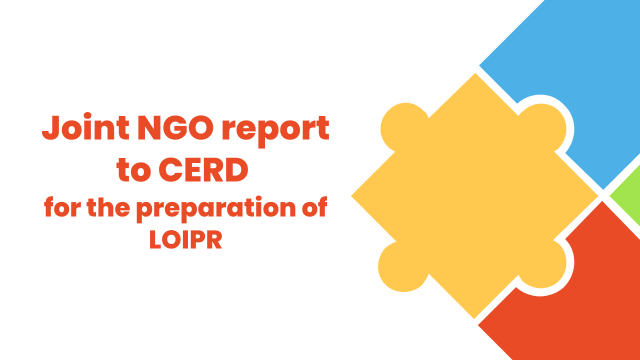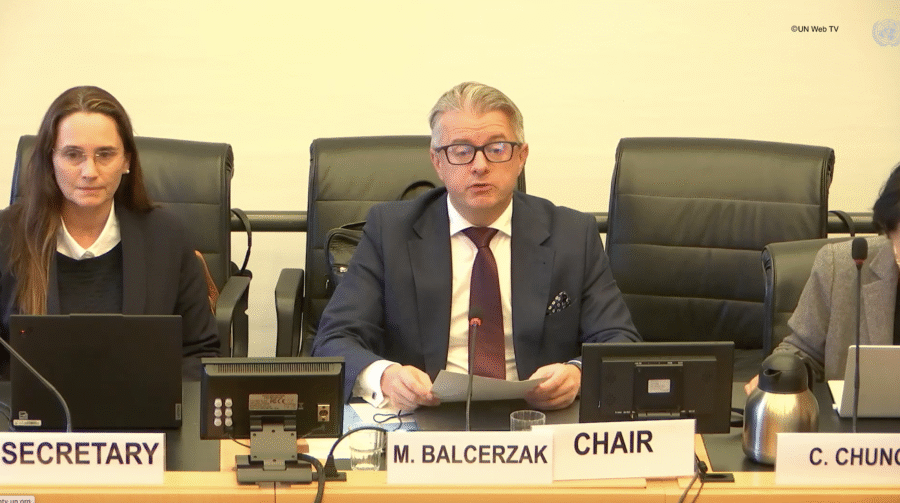CERD 113th session summary: Belarus, Bosnia and Herzegovina, Iran, Iraq, Pakistan, the United Kingdom, and Venezuela
August 29, 2024
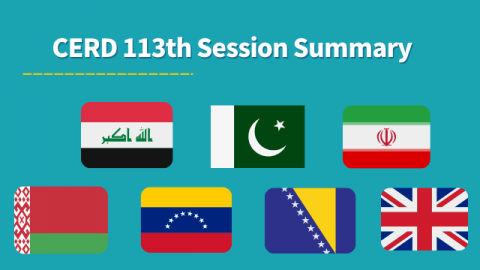
From 5 August to 23 August 2024, the UN Committee on the Elimination of Racial Discrimination (CERD) held its 113th session.
In this session, the Committee reviewed and adopted concluding observations on Belarus, Bosnia and Herzegovina, Iran, Iraq, Pakistan, the United Kingdom of Great Britain and Northern Ireland, and Venezuela.
Additionally, the Committee adopted its general recommendation no. 37 on racial discrimination and the enjoyment of the right to health.
CERD also held discussions with the Committee on Migrant Workers to develop a joint general comment/recommendation on addressing and eradicating xenophobia and its impact on the rights of migrants, their families and other non-citizens affected by racial discrimination. As a next stage, the Committee will have global and regional consultations in September, October and November 2024.
In its concluding session, the Committee recalled that: (a) it adopted a statement concerning the situation of Rohingya fleeing Myanmar to India on 29 June 2024 under its Early Warning and Urgent Action procedure. It also endorsed letters to the State parties assessed under this procedure. (b) the ad hoc Conciliation Commission about the interstate communication submitted by the State of Palestine against Israel formally adopted its report on 19 February 2024.
Concluding observations and reports of the State parties and other stakeholders are available on the session’s webpage. Video archives of the public meetings can be accessed at UN Web TV.
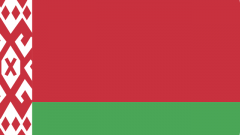
Belarus
Belarus had an interactive dialogue with the Committee on 15 and 16 August 2024 and concluded its consideration of the combined 24th and 25th periodic report. The Committee welcomed the State’s strategies for the promotion of interethnic peace. At the same time, it questioned the removal of citizens’ nationality while abroad and the dissolution of non-governmental organizations (NGOs), such as ethnic minority associations, after the 2020 post-election protests.
In its concluding observation, among other things, the Committee emphasised its concern about the conditions of migrants, asylum seekers, and refugees at the State’s border with the European Union, given the information on excessive use of force, arbitrary detention and obstacles in accessing asylum procedures. Against this backdrop, the Committee called upon the State party to immediately take action to secure the lives and safety of people at the border, prevent excessive use of force and offer human rights training to law enforcement officials and border guards.
The Committee issued recommendations on the following topics:
- National mechanism for reporting
- Statistics
- Domestic application of the Convention
- Definition and criminalization of racial discrimination
- National human rights institutions
- Independence of judiciary
- Trafficking in person
- Counterterrorism and extremism measures
- Excessive use of force
- Racist hate speech
- Acts of racial discrimination and access to justice
- Situation of Roma
- Situation of national and other minorities
- Situation of non-citizens, including asylum seekers, refugees and migrants
- Human rights training
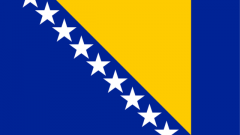
Bosnia and Herzegovina
On 12 and 13 August 2023, the Committee held an interactive dialogue with the State delegation of Bosnia and Herzegovina and adopted its consideration of the combined 14th and 15th periodic report. While the Committee commended the State party’s statelessness policy, it raised concerns about attacks on returnees and the education of Roma children.
In its concluding observation, the Committee highlighted its concerns about, among other things, discrimination and marginalisation of Roma, which persistently prevent them from fully enjoying their rights enshrined in the Convention. Prominent issues include poor living conditions, restricted access to public services and formal employment, particularly for Roma women, inadequate healthcare, and low education enrollment and attendance rates of Roma children. The Committee urged the State party to enhance its efforts to address systemic discrimination against Roma. The State party should improve Roma housing and living conditions by genuinely consulting with them, ensuring access to employment and vocational training, fighting against workplace discrimination, and increasing Roma children’s enrollment and attendance in education. It also should have accessible and culturally appropriate healthcare services, especially for Roma women and girls.
The Committee’s recommendations cover the following topics:
- Statistics
- Legislation on prohibition of discrimination
- Discriminatory electoral provisions
- National human rights institutions
- Compliance of criminal legislation with articles 1 and 4 of the Convention
- Racist hate speech and hate crimes
- Racial discrimination in sports
- Political participation of ethnic and national minorities
- Right to education
- Discrimination against Roma
- Situation of Returnees
- Civil Registration
- Multiple and intersectional discrimination
- Situation of migrants, asylum-seekers and refugees
- Trafficking in persons
- Access to justice
- Transitional justice
- Racial prejudice and stereotypes
- Ethno-religious division and tensions
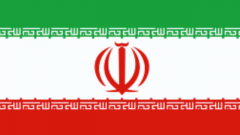
Iran
The interactive dialogue took place on 7 and 8 August and concluded considering the combined 20th to 27th periodic report of Iran. Despite commending the State for hosting the greatest number of refugees around the world, the Committee raised concerns about combating hate speech in the media, the treatment of ethnic minorities in the midst of the September 2022 protests and among other things.
In its concluding observation on Iran, among other things, the Committee underscored its concerns that ethnic and ethno-religious minorities are reportedly overrepresented in the criminal justice system and are disproportionately at risk of arbitrary detention and death sentences. The Committee urged the State party to review its legal framework, repeal vaguely worded criminal offences punishable by death, guarantee fair and due process for minority groups, and set up a moratorium on the death penalty to abolish it.
The recommendations the Committee made include the following topics:
- Statistics
- National human rights institutions
- Prohibition of racial discrimination
- Special measures to address inequalities
- Complaints of racial discrimination
- Hate speech and hate crimes
- Racial profiling and lethal use of force
- Women belonging to ethnic and ethno-religious minority groups
- Citizens’ Rights Charter and reports of structural discrimination
- Socio-economic situation of ethnic and ethno-religious minority groups
- Rights to freedom of expression and association in the context of the 2021 amendments to the Criminal Code
- Rights to freedom of peaceful assembly and association in the aftermath of the November 2019, July 2021 and September 2022 protests
- Criminal justice system
- Minorities in political and public affairs
- Right to education
- Birth registration, identity documents and statelessness
- Refugees, asylum seekers and undocumented migrants
- Training, education and other measures to combat prejudice and intolerance

Iraq
On 14 and 15 August 2023, the Committee held an interactive dialogue with the state delegation of Iraq and concluded its consideration of the combined 26th and 27th periodic report. While the Committee applauded the State’s efforts to improve the National Human Rights Institute, it raised questions on measures taken against hate speech as well as the situation of migrant workers.
In its concluding observation on Iraq, among other things, the Committee expressed its concerns that the decision to close all camps for internally displaced persons (IDP) by the end of 2024 could reportedly lead to the involuntary and forced return of those belonging to ethnic and ethno-religious minority groups and warned that many of them would have to return areas that are severely damaged by armed conflict without adequate infrastructure. The Committee called upon the State party to guarantee that returns or resettlements are carried out in a safe and genuinely voluntary manner.
The recommendations the Committee issued cover the following topics:
- Statistics
- Convention in the domestic legal order
- National human rights institution
- Complaints of racial discrimination
- Hate speech and hate crimes
- Racial profiling and racially motivated police violence
- Transitional justice
- Internally displaced persons
- Minorities in public and political life
- Right to education
- Right to health
- People of African descent
- Roma
- Stateless persons
- Refugees, migrants and asylum seekers
- Migrant workers
- Training, education and other measures to combat prejudice and intolerance

Pakistan
Pakistan had an interactive dialogue with the Committee on 8 and 9 August 2024 and concluded considering its combined 24th to 26th periodic report. Whereas the Committee applauded that the Pakistan National Human Rights Commission got ‘A’ status recently, it asked questions concerning the State’s blasphemy laws, the implementation of the illegal foreigners repatriation plan and so forth.
In its concluding observation on Pakistan, among other things, the Committee emphasised the right to a fair trial of those accused of blasphemy with concerns about the treatment of suspects, such as deaths in police custody and prolonged legal proceedings. The Committee called upon the State party to prevent and protect individuals against violent reprisals, to repeal its blasphemy laws, to ensure fair trials and to prosecute all acts of violence.
The recommendations the Committee gave include the following topics:
- Data collection
- The Convention in domestic law and the institutional and policy framework for its adoption
- National human rights institution
- National commission on minorities
- Racist hate speech, incitement to racial hatred and hate crimes
- Attacks and reprisals against persons accused of blasphemy
- Enforced disappearance of ethnic and ethno-religious leaders, politicians, public officials, and human rights defenders
- Equal public and political participation
- Economic, social and cultural rights
- Freedom of religion or belief
- Forced conversions and marriages
- Jirgas
- Access to justice and effective remedies
- Non-citizens, including migrants, refugees and asylum seekers
- Education to combat prejudices and promote understanding

United Kingdom of Great Britain and Northern Ireland
On 13 and 14 August 2024, the Committee held an interactive dialogue with the state delegation of the United Kingdom and concluded its consideration of the combined 24th to 26th periodic report. Despite noting the State authorities’ prompt response to conduct investigations into recent racist riots, the Committee questioned immigration law reform, compensation for victims of the ‘Windrush’ scandal and other matters.
In its concluding observation on the United Kingdom, among other things, the Committee was concerned about the persistent hate crimes, hate speech and xenophobic incidents on different platforms as well as by politicians and public figures. The Committee called upon the State party to implement comprehensive measures to curb racist hate speech and xenophobic rhetoric and highlighted the need for thorough investigations, strict penalties for racist hate crimes and effective remedies offered to the victims and their families.
The Committee’s recommendations cover the following topics:
- Statistics
- Incorporation of the Convention in the domestic legal order
- Human rights framework
- Legislation against racial discrimination
- National human rights institutions
- Public policies and plans for combating racial discrimination
- Racist hate crimes and hate speech
- Paramilitarism and racism in Northern Ireland and ethnic and religious prejudice in Scotland
- Racism in sports
- Structural discrimination and special measures to address inequalities
- Participation in political and public life
- Rights to freedom of peaceful assembly
- Racial profiling, stop and search, and excessive use of force by law enforcement officials
- Counter-terrorism measures
- Criminal justice system and juvenile justice system
- Poverty, employment and social security
- Housing and homelessness
- Health
- Education
- Situation of migrants, asylum seekers and refugees
- Access to justice
- Windrush generation
- Forced assimilation of Gypsy/ Traveller communities in Scotland
- Forcible eviction of Chagossians from Diego Garcia
- Lingering effects of colonialism and slave trade
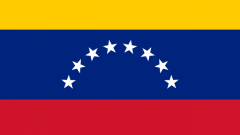
Venezuela
The interactive dialogue took place on 6 and 7 August 2024 and concluded considering the combined 22nd to 24th periodic report of Venezuela. While the Committee applauded the State for the strides achieved by its committee in the fight against racial discrimination, it questioned the removal of three Indigenous parliaments and measures taken for the promotion of the rights of people of African descent.
In its concluding observation on Venezuela, among other things, the Committee expressed its serious concerns about the negative impact of mining on indigenous lands and the livelihood of indigenous people, underscoring the situation in the National Strategic Development Zone “Orinoco Mining Arc”. The Committee urged the State party to refrain from deploying military forces and carrying out military operations in indigenous territories without prior consultation with those concerned and to set up effective accountability mechanisms for possible human rights violations.
The Committee’s recommendations (original text in Spanish) include the following topics:
- Cooperation with civil society and human rights defenders
- Data collection
- Ombudsman’s office
- Law against hatred
- Structural discrimination
- Situation of Indigenous Peoples
- Demarcation of Indigenous lands
- Prior consultation
- Impact of mining on Indigenous Peoples’ territories
- Civil Registration
- Political participation of Indigenous Peoples
- Discrimination against people of African descent
- Multiple and intersecting forms of racial discrimination
- Violence against Indigenous and Afro-descent women
- Situation of migrants, asylum seekers and refugees
- Access to justice
- Situation of human rights defenders
- Combating racial stereotypes
*Its next session will be held from 25 November to 13 December, reviewing the reports of Armenia, Ecuador, Greece, Kenya, Monaco and Saudi Arabia.


